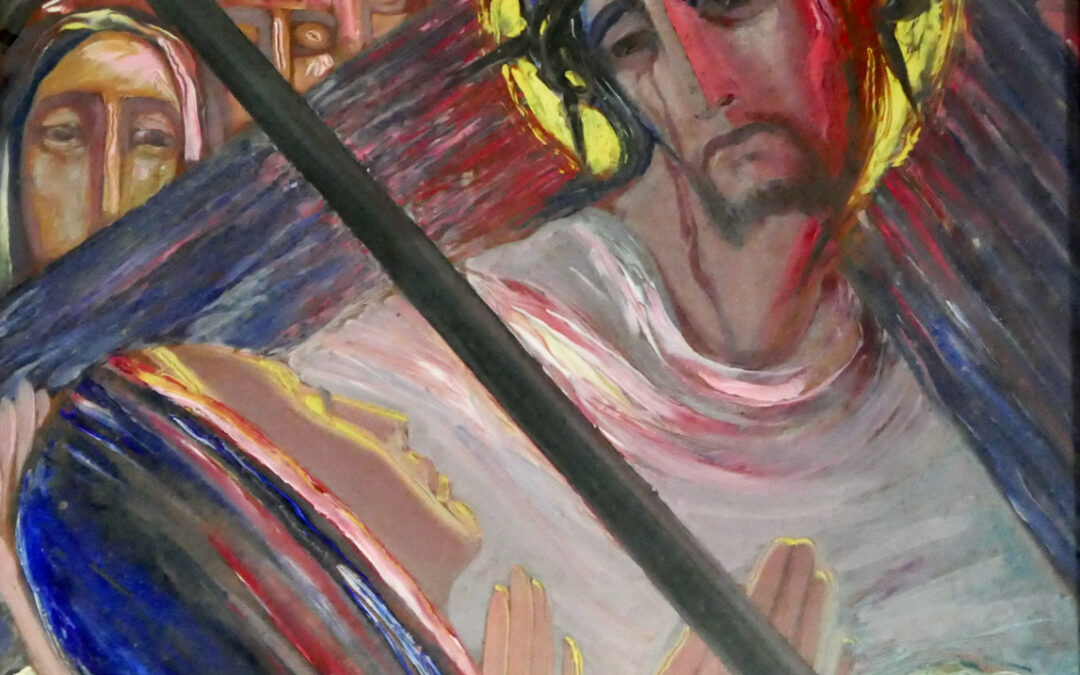Stations of the Cross. Richard King (1907-1974), Ireland
Then he began to teach them that the Son of Man must undergo great suffering,
and be rejected by the elders, the chief priests, and the scribes, and be killed,
and after three days rise again. He said all this quite openly. And Peter took him
aside and began to rebuke him. But turning and looking at his disciples, he
rebuked Peter and said, “Get behind me, Satan! For you are setting your mind
not on divine things but on human things.” He called the crowd with his disciples,
and said to them, “If any want to become my followers, let them deny themselves
and take up their cross and follow me. For those who want to save their life will
lose it, and those who lose their life for my sake, and for the sake of the gospel,
will save it. For what will it profit them to gain the whole world and forfeit their
life? Indeed, what can they give in return for their life? Those who are ashamed
of me and of my words in this adulterous and sinful generation, of them the Son
of Man will also be ashamed when he comes in the glory of his Father with the
holy angels.” -Mark 8:31-38
Lent’s hardest sacrifice is giving up illusion: illusions about God, the world, safety,
yourself. Peter tries to cling to an illusion. Jesus’ harsh rebuke is devastating – meant
not only for Peter, but all of us.
Sometimes it’s necessary to abandon the illusion of what you previously called “faith.”
As you mature as a Christian, faith draws you to a dark realm beyond reason. Reason is
merely a place-mark of discernment: the content of the pages can shock with their
unreasonable wonder, complexity, beauty, horror, emptiness.
All the scripture readings for Sunday reference faith in some way. God initiates a
reciprocal pact of faith with Abraham. The Psalmist remembers God’s former
faithfulness in order to find faith in present distress despite the jeering of companions.
Paul considers how Abraham’s irrational faith blessed him. Jesus asks his followers to
follow him in faith to the Cross.
William Law (1686-1761) was a priest of the Church of England. His book A Serious
Call to a Devout and Holy Life, was enormously influential in its day and continues to
offer readers a way to holiness that is clear, lucid, and practical. He says, “Now as it was
the spirit of the world that nailed our Blessed Lord to the Cross; so every man that has
the spirit of Christ, that opposes the world as he did, will certainly be crucified by the
world, in some way or other” (A Serious Call XVII). Law had direct experience of being
crucified by the world. He lost his fellowship at Cambridge University when he refused
to take the oath of allegiance to George I, believing that to do so would be a violation of
his oath to the House of Stuart. He thereby lost not only his fellowship but any
advancement in the Church of England.
The great majority of Church of England clerics did take the oath of allegiance to the
new monarch. Several hundred years later, it can be difficult to imagine how high the
stakes appeared to Law. Despite what his decision cost him, he seems never to have
regretted it. Paradoxically, the constraint of his conscience opened up a vast inner
freedom. The late Irma Zaleski writes in her book Repentance:
All great religious traditions recognize that the deepest desire of the human heart
is for freedom from inner oppression. We feel “conditioned”: bound by the chains
of our habits and compulsions, our likes and dislikes, our fears and guilt, our
inability to love. Our great tragedy is that we so often mistake these habits and
compulsions for our true self. Perhaps most of us operate on the assumption that
this conditioned, unfree self is all there is, all we can ever be, and we fear that
without it we could not exist at all. We are unable, therefore, to stop protecting
ourselves at all cost. This fear, however, is an illusion and we need to be freed
from it.
We might wish that Jesus could find a nicer, more elegant, more tasteful and
reasonable way of defeating sin and death rather than submit to the radical violence
and self-sacrifice of the cross. Not only will Jesus have to take up his cross, you and I
will have to do so as well. There is no nicer, more elegant, tasteful and reasonable way,
even if we limit our circle to nice, elegant, reasonable churchy people. True life requires
complete surrender to it. What would be the point of gaining the whole world if it means
falling short of true life?
“Why should I be anxious? It is not up to me to think of myself. It is up to me to think of
God. And it is up to God to think of me.” Simone Weil (1909-1943).
Kevin+


Recent Comments